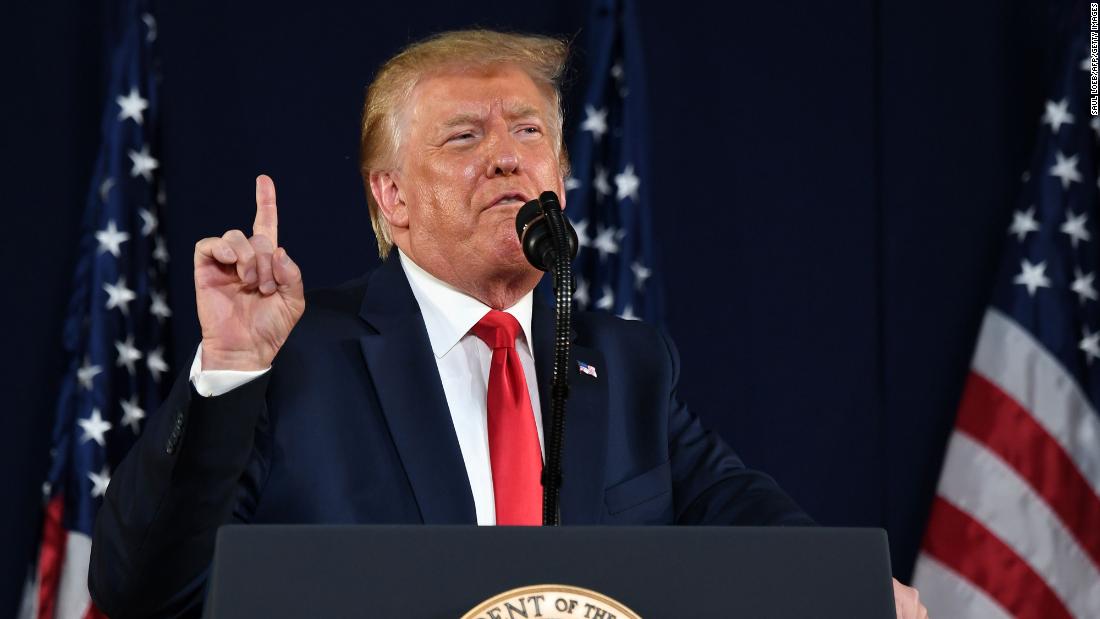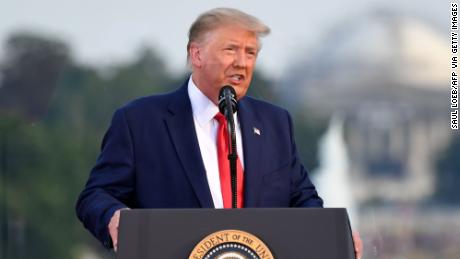With American lives on the line, the question is whether or not Republicans will continue to be silent as Trump peddles fiction
While Republicans deserted Trump on the issue of facial coverings — with many urging Americans to wear masks over the past week — they have been mostly silent about Trump’s effort to deceive the public about the risks the virus poses.
The President’s falling poll numbers, particularly in swing states in his matchup against former Vice President Joe Biden, are now an area of intense concern for Republicans, and many longtime GOP strategists are puzzled by his dual strategy of ignoring the virus while trying to incite race wars.
A majority of Americans do not approve of Trump’s handling of the pandemic (or his response to the nation’s racial reckoning), which has stirred consternation even in his own campaign as the President banks on an economic revival and good news about a vaccine to restore his political fortunes.
While Friday’s and Saturday’s speeches marked new heights in terms of inflammatory language from the President, many Republicans have long been uncomfortable with Trump’s penchant for falling back on culture war tropes and racially incendiary language that he thinks stirs fealty to him within his base.
Afraid to contradict the President on coronavirus
As public health officials sound the alarm about a surge of new coronavirus cases throughout the country, the White House task force dedicated to the pandemic did not meet this weekend, a person familiar with the schedule told CNN’s Kaitlan Collins, though a meeting was scheduled for Monday afternoon.
Though the task force has started meeting more regularly in recent weeks after a period with few meetings, it has not resumed meeting on the weekends like it did in the early months of the outbreak. Task force officials were invited to the Fourth of July event on the South Lawn where there was little social distancing and few people wore masks, one person said. While several attended the festivities, others declined that invite.
Meanwhile, the President’s view that the US has turned the corner on Covid-19 has also increasingly isolated him from key Republican leaders, like Texas Gov. Greg Abbott, who are pleading with the public to wear masks and stay home. Yet the President’s punitive nature — and the long list of people he has fired or tweeted about negatively after they contradicted him — still makes GOP elected officials and his own public health experts loathe to criticize or correct him.
An example of that dynamic came Sunday when Bash repeatedly pressed US Food and Drug Commissioner Dr. Stephen Hahn to explain the President’s false statement that 99% of coronavirus cases are “totally harmless.”
“I’m not going to get into who is right and who is wrong,” Hahn, a member of the White House coronavirus task force, told Bash during CNN’s “State of the Union” when she asked him to explain why the President made the claim when his public health experts have said exactly the opposite.
“What I’ll say is that we have data in the White House task force. Those data show us that this is a serious problem. People need to take it seriously,” the FDA chief said.
One exception was the Republican mayor of Miami-Dade County, Carlos Gimenez, who contradicted the President Sunday as he finds his county in an difficult predicament: “The virus is not harmless. No, absolutely not,” Gimenez said Sunday on CBS News’ “Face the Nation.” Noting the positivity rate is around 20% in his area, he said that more Floridians need critical care.
“When you have more (cases), you obviously will have more hospitalizations, more ICUs, more respirators, and unfortunately, you’ll have more fatalities,” Gimenez said.
Meanwhile, Trump’s former Homeland Security adviser Tom Bossert tweeted the ominous message Sunday: “We are in trouble…. Once a state is over 1% prevalence, it becomes much harder to extinguish the flare up,” Bossert tweeted. “It will take a huge effort to put out these outbreak fires. More than masks alone. We could top 500k US deaths this year if this trend continues.”
More Trump rallies amid alarming signs of coronavirus spread
Though US coronavirus fatalities are down, there are few signs that the virus is going to disappear. The spike in patients overwhelmed some Texas hospitals as concerns grow about shrinking capacity in intensive care units. Florida set an all-time record for the most cases in a single day Saturday, surpassing the previous record set in New York in mid-April. Former FDA Commissioner Dr. Scott Gottlieb warned Sunday on CBS’s “Face the Nation” that there’s “no clear line of sight on how we’re going to get this under control.”
The political polarization of the virus, driven in no small part by conflicting messages from Trump and his public health experts, was in the spotlight over the holiday weekend.
Weekend images emerged of partygoers dancing and shouting with no distancing at an event in Diamond Lake, Michigan, and closely packed crowds at a Wisconsin waterpark.
But the concern is that the President’s descriptions of an innocuous virus will lead his supporters to let their guard down. In direct contradiction to Trump’s “totally harmless” assertion, the US case fatality rate from coronavirus stood at 4.6% this weekend, according to Johns Hopkins University data.
Miami Beach Mayor Dan Gelber, a Democrat, told CNN’s Boris Sanchez Sunday that the situation in Miami is “going to get much worse,” and he said the disconnect between the reality on the ground and the President’s message is making it much harder to force Floridians to heed the guidance of health experts.
“We’re telling people to make sacrifices, to put on masks, to socially distance themselves from people they love, to make sacrifices for others,” Gelber said. “Friday night, the President is hosting this huge event where none of those countermeasures were being followed. So how do we tell people to swallow very difficult medicine when the President, by his action and his words, is telling them they don’t have to?”
It is not yet clear what damage that may inflict on Trump’s fellow Republicans with the President on the top of the ticket in November — and whether they will continue to stand with him as his message becomes more dangerous.
This story has been updated to reflect that the White House coronavirus task force did not meet over the weekend but has a meeting scheduled for Monday.
![]()






